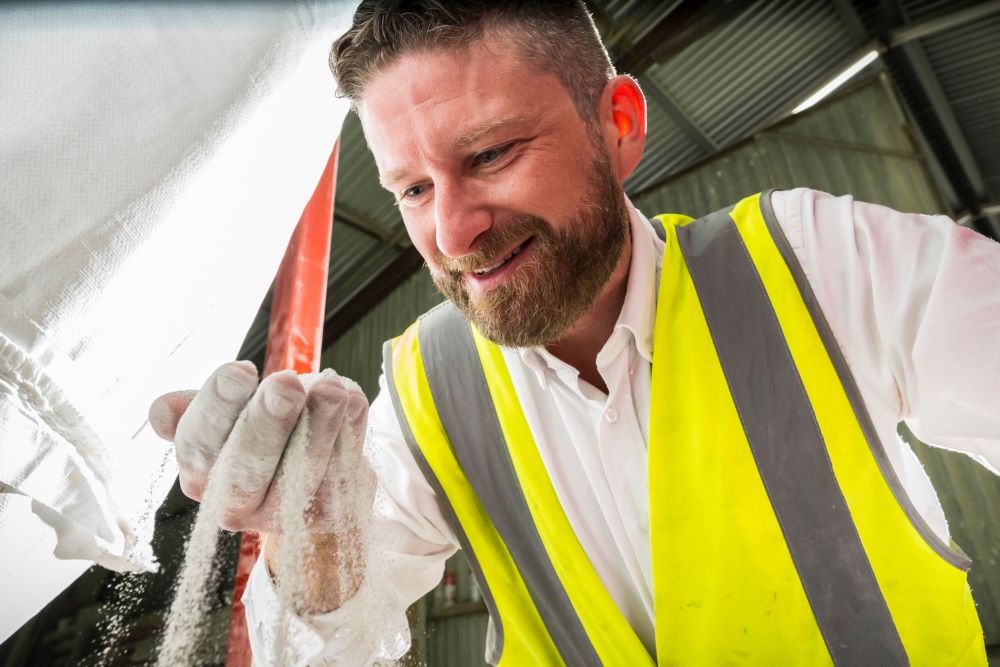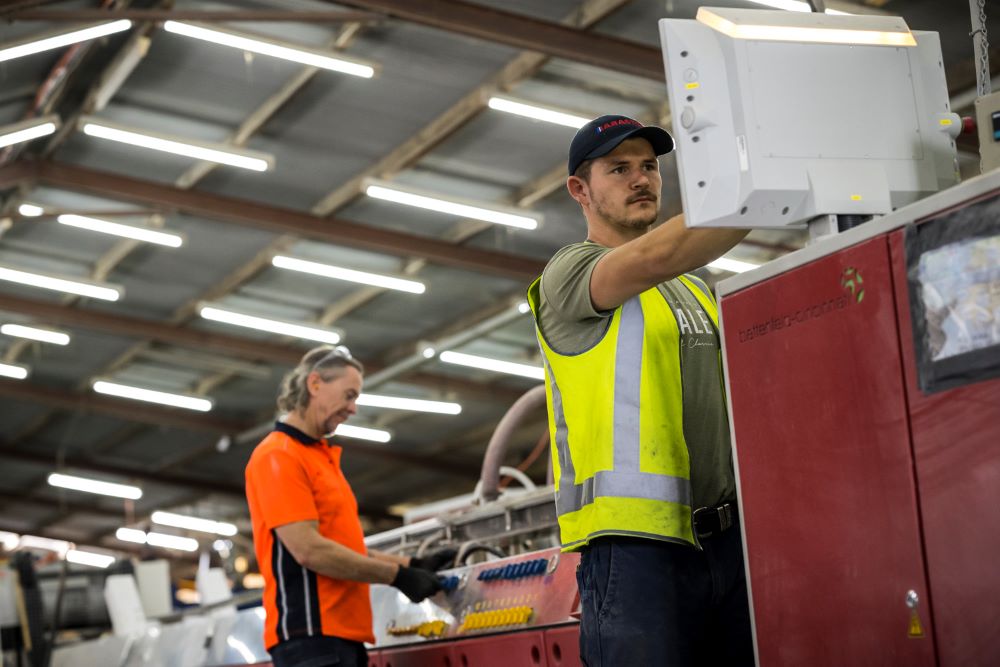
Think Fencing founder Jack Fitzgerald has been a pioneer in plastics from a young age. As a 16-year-old living on a property near Portarlington, he saw the material’s potential.
After witnessing one of their horses getting caught in farm paddock fencing, he invented a clip-on solution to make wire fences easier to see and help stop the animals from getting injured.
Fast forward 20 years and Jack and his company are manufacturing fencing and decking products, with discussions underway to export them overseas to Israel, China, Hong Kong and New Zealand. And he’s making them from recycled PVC.
The world of plastics didn’t pique his interest by chance. Jack’s dad was also a trailblazer in the plastic pipe industry.
'In his younger years he was a plumber until he started to make PVC pipe fittings for stormwater downpipes - before he got involved in this side of the industry most downpipes were made out of sheet metal,' he says.
Polyvinyl chloride, or as it’s commonly known, PVC - is durable, has a long life, and is used in all kinds of products, from flooring to cables and medical supplies. It’s one of the top 4 polymers consumed in Australia by weight but has one of the lowest recycling rates.
'PVC is a huge problem and we’ve just been making it and not coming up with solutions to recycle it and to repurpose it,' says Jack.
'What we’re seeing in the industry is a whole lot of PVC going into landfill - so that’s windows, bank cards, electrical wires, medical supplies. A lot of this material is premium scrap - it’s not dirty.'
Expanding his facility in his hometown of Portarlington, Jack started his quest to make building materials more sustainable.
Thanks to Government support via Regional Development Victoria, Jack was able to secure a grant that he used to purchase an extruder, which melts shredded plastic to form the new decking.
This extruder was the catalyst for Jack’s further investment in PVC recycling – shredding and analysing hard to recycle PVC scrap plastic that would normally go to a landfill.
'We’re making decking that was once electrical conduit underground in the city in Melbourne. That decking will be delivered to a customer in Clifton Springs.'
'And it can be recycled again and again.'
Closing the loop on the ‘plastic pipeline’ has been the life work of researcher Qamar Schuyler. She is a research scientist with CSIRO’s ‘Ending Plastic Waste’ mission.
'An estimated 2 and a half garbage trucks worth of plastic enter our lakes, rivers and oceans every minute of every hour, of every day of the year - our current relationship with plastic is not sustainable,' says Qamar.
'But we can build a system piece by piece that can help us reduce and reuse our plastic resources into the future.'
Working with Think Fencing, the CSIRO is hoping to build that system, but Qamar says this is difficult when it comes to recycling PVC.
'The issue with PVC is that there are thousands of different formulations - a PVC downpipe has totally different formulations to PVC fencing; it’s different to a garden hose, or cladding. This makes it hard and expensive for businesses to recycle.'
With so many formulations the CSIRO has partnered with Think Fencing to build a PVC analyser.
'What Jack is developing is an analyser, a tool that can analyse the composition of PVC,' Qamar says.
'What we at the CSIRO are particularly interested in is how this analyser is using Artificial Intelligence technology to fast track that process.'
'What I find interesting,' Jack says, 'is that no one has tried to do this. With the analyser and the way we are putting it together - it has never been done in the world.'
'We just looked at what old school recyclers do. They look at it, they smell it, they look at the temperature and the pressure. From there they use their own industry knowledge to determine what needs to be added to the material.'
By breaking down scrap PVC into a powder-like substance, Think Fencing can create new decking and fencing supplies.
With the analyser fully operational, Jack could save tonnes of PVC from landfill and expand his PVC products.
This work has earned the company a slew of awards, including:
- Excellence in Sustainability in Manufacturing from the Geelong Manufacturing Council’s 25th Anniversary and Awards Dinner
- Best Presentation at the CSIRO’s Ending Plastic Waste Symposium
- Leader in Manufacturing Award at the 2023 Victorian Manufacturing Hall of Fame Awards
- Advancing Circularity Award from the Vinyl Council Australia.
In December 2023, Jack also won the Business Award from the Portarlington Business Development Association. The CSIRO hopes to perfect the prototype and is developing a set of standard specifications for PVC recycled materials.
'The development of standards for PVC recycling can help to overcome one of the biggest challenges for recycling PVC,' Qamar says, 'and that’s the perception that it is not worth recycling.'
The project is leading the way in taking waste PVC from ‘scrap’ to ‘commodity’, a product Jack has always seen as premium.
'My vision is of building a house - predominantly made out of recycled PVC materials and I want it to be an affordable realistic product,' he says.
'That’s the end goal. I want to see this in the next 5 years, and I’m going to do it.'
Support for Think Fencing’s Recycled PVC Decking Innovation Project forms part of our record investment of $45 billion over the past decade into projects and programs that are making rural and regional Victoria even better places to live, work, stay and play.






